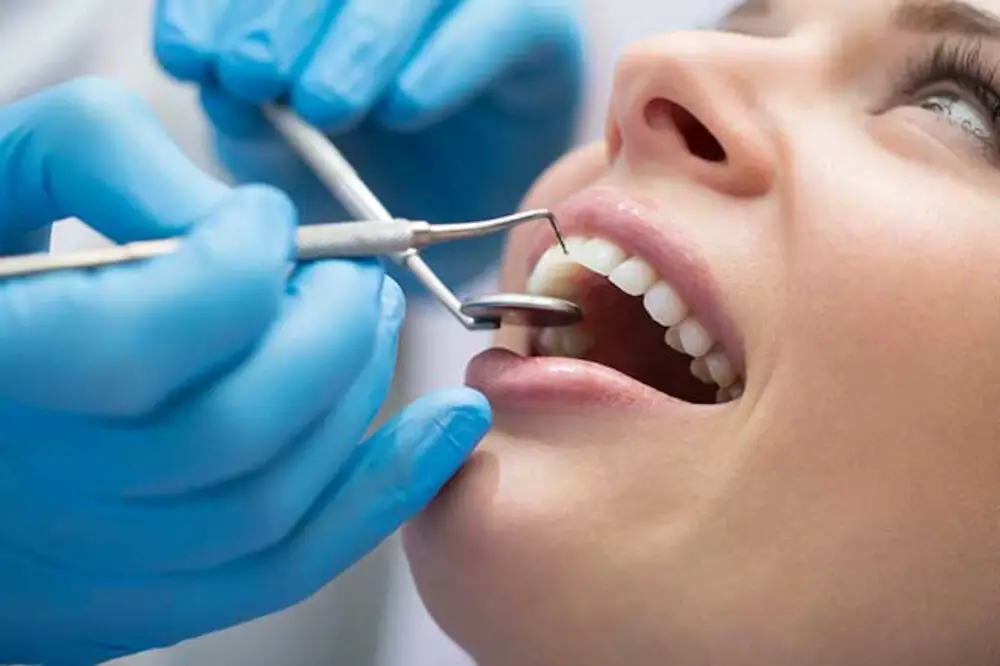Why Do Sweet Foods Cause Tooth Pain? Explained by Dental Experts

Sweet foods and drinks are often a guilty pleasure for many of us. They can provide temporary relief and pleasure, but at the same time, they can cause tooth pain that is difficult to bear. This pain can range from a mild sensitivity to a sharp shooting pain that can disrupt your daily routine and make it difficult to enjoy the little things in life. So, what is the reason behind this phenomenon? Why does consuming a sweet treat cause tooth pain? Fortunately, dental experts have shed some light on this topic, and in this article, we will explore their findings and explanations. Tooth pain is a common problem that affects millions of people worldwide. It can be caused by a variety of factors, such as tooth decay, gum disease, or trauma. However, one of the most common causes of tooth pain is the consumption of sweet foods and drinks. This is because sugar is a major culprit when it comes to dental problems. When we consume sugary foods and drinks, the bacteria in our mouth feed on the sugar and produce acid as a byproduct. This acid can then erode the enamel, which is the hard outer layer of our teeth, causing tooth sensitivity and pain. In addition, sugary foods can also cause inflammation in the gums and lead to gum disease, which can further exacerbate the problem.
Tooth pain caused by sweet foods is a common dental problem that affects many individuals around the world. Sweet foods, such as candy, soda, and other sugary snacks, contain high levels of sugar that can easily stick to teeth and create an environment for bacteria growth. When bacteria feed on these sugars, they produce acids that attack the enamel, leading to tooth decay, cavities, and sensitivity. The acidic environment created in the mouth can also irritate the nerves in the pulp, causing sharp and intense pain when consuming sweet foods. To prevent tooth pain caused by sweet foods, it is important to maintain good oral hygiene habits, limit sugar intake, and visit a dentist regularly for check-ups and cleanings.
Understanding the cause of any problem is crucial in finding the most effective solution, and the same holds true for tooth pain caused by sweet foods. Dental experts explain that the underlying cause of this type of pain is often related to tooth decay or sensitivity caused by erosion of the tooth enamel. Identifying the root cause of the problem can help patients take the necessary steps to prevent further damage to their teeth, such as improving their oral hygiene routine or seeking treatment from a dentist. In addition, knowing the cause of tooth pain can help patients make more informed decisions about their diet and lifestyle choices, reducing the risk of developing dental problems in the future. Overall, understanding the cause of sweet food-related tooth pain can lead to better dental health and a happier, pain-free smile.
The article titled \Why Do Sweet Foods Cause Tooth Pain Explained by Dental Experts\ follows a clear and structured format, which makes it easy for readers to understand the topic in question. The article begins with an introduction that briefly describes the issue at hand, which is tooth pain caused by sweet foods. The article then proceeds to explain the science behind this phenomenon, with dental experts providing insights and explanations on the topic. The article is well-researched, presented in a logical sequence, and supported by credible sources, which adds to its credibility. The conclusion summarizes the key points discussed in the article and provides readers with a takeaway message. Overall, the article is a well-organized and informative read for anyone interested in dental health and the effects of sweet foods on teeth.
How Sweet Foods Affect Teeth

Sweet foods can be a delight to the taste buds but can also lead to tooth pain and decay. The sugars in sweet foods react with the bacteria in the mouth to produce acid. This acid then attacks the enamel, the protective outer layer of the tooth, and causes it to erode. When the enamel is weakened, the tooth becomes vulnerable to decay and cavities. The acid produced by the bacteria also irritates the nerves in the tooth, resulting in tooth sensitivity and pain. The more frequently sweet foods are consumed, the greater the risk of tooth decay and pain. It is not only the amount of sugar consumed that affects teeth but also the frequency and duration of exposure. When sweet foods are consumed over a prolonged period, the mouth is constantly exposed to acid, which can lead to the demineralization of the tooth’s enamel. This can result in the formation of cavities and tooth decay. Additionally, sticky sweet foods such as candy can cling to the teeth for longer periods, providing a more extended exposure to the acid-producing bacteria. To protect teeth from the harmful effects of sweet foods, it is essential to maintain good oral hygiene and limit the consumption of sugary foods and drinks. Regular brushing and flossing can help remove the plaque and bacteria that cause tooth decay and pain.
Tooth decay and cavities are caused by the erosion of the enamel and dentin layers of the teeth due to the acid produced by bacteria in the mouth. When you consume sugary or starchy foods, the bacteria in your mouth feed on the carbohydrates and produce acid as a byproduct. This acid then attacks the enamel, causing it to weaken and eventually erode. As the enamel erodes, the underlying dentin layer becomes exposed, leading to tooth sensitivity and pain. If left untreated, the erosion can progress to form cavities, which are holes in the teeth. To prevent tooth decay and cavities, it’s important to maintain good oral hygiene and limit your consumption of sugary and starchy foods.
Bacteria play a critical role in tooth decay. When we consume sweet foods, the bacteria in our mouth feed on the sugars and produce acid as a byproduct. This acid then attacks the enamel of our teeth, breaking it down and leading to cavities. Streptococcus mutans is one of the most common types of bacteria found in the mouth and is particularly adept at producing acid. Poor oral hygiene can also contribute to the growth of harmful bacteria, further exacerbating the problem. Therefore, it is important to maintain good oral hygiene practices and limit our intake of sugary foods to prevent tooth decay.
Sugar is a key source of energy for bacteria, including the ones that dwell in the mouth. When sugar is consumed, it gets broken down into simple sugars by enzymes in the mouth. These simple sugars are then used by bacteria as a food source, allowing them to grow and multiply. As bacteria feed on sugar, they produce acids as a byproduct, which can lead to tooth decay and sensitivity. The more sugar consumed, the more fuel bacteria have to grow and cause damage to the teeth. Therefore, it’s essential to limit sugar intake and practice good oral hygiene to prevent the growth of harmful bacteria in the mouth.
Types of Sweet Foods That Cause Tooth Pain

Sweet foods are often the main culprits behind tooth pain and sensitivity. When we consume excessive amounts of sweets, the bacteria in our mouths feed on the sugar and produce acid, which gradually erodes the enamel of our teeth. This process, known as tooth decay, can cause pain and discomfort, especially when we consume hot, cold, or sweet foods. Some of the most common sweet foods that cause tooth pain include candy, chocolate, cakes, soda, and other sugary drinks. Candy is one of the most popular sweet treats in the world, but it can also be one of the most damaging to our teeth. Hard candies, in particular, are notorious for causing tooth pain, as they take a long time to dissolve and expose our teeth to sugar for extended periods. Chocolate, although less harmful than candy, can still cause tooth pain if consumed in large quantities or in combination with other sweet foods. Similarly, cakes and other baked goods are high in sugar and can cause tooth decay, especially if consumed regularly. Finally, soda and other sugary drinks are some of the worst offenders when it comes to tooth pain, as they not only contain high amounts of sugar but also have a low pH, which can erode our teeth’s enamel over time.
When it comes to sweet foods, there is a wide variety to choose from. From decadent chocolate cakes to refreshing fruit sorbets, sweet treats can satisfy any sweet tooth. However, it’s important to note that not all sweet foods are created equal. Some, like hard candies and taffy, can stick to teeth and cause prolonged exposure to sugar. Others, like sugary drinks and sports drinks, can bathe teeth in acid and cause erosion. Even seemingly healthy sweet foods, like dried fruits and granola bars, can contain high levels of added sugars. To protect our teeth, it’s important to limit our intake of sweet foods and opt for alternatives like fresh fruit or sugar-free gum.
Consuming sweet foods can cause tooth pain due to the various types of sugar affecting teeth differently. Simple sugars like glucose and fructose are easily broken down by bacteria in the mouth, producing acid that attacks tooth enamel and causes decay. Sticky and chewy sweets like gummies and caramels stick to teeth and are harder to remove, providing a food source for bacteria to thrive on and leading to decay. Acidic sweets like citrus fruits and sour candies can erode tooth enamel, making teeth sensitive and more prone to decay. Even natural sugars found in fruits and juices can cause damage if consumed in excess. It is important to practice good oral hygiene and limit sugary foods to maintain healthy teeth and prevent tooth pain.
Sweet foods are a guilty pleasure for many individuals, but they can also cause tooth pain. Some popular sweet foods that can lead to dental discomfort include candy, chocolates, ice cream, cakes, and pastries. These food items contain high levels of sugar, which can mix with the bacteria in the mouth to create an acidic environment. The acid can then erode the enamel of the teeth, leading to tooth decay and sensitivity. Additionally, sticky and chewy candies can get stuck in between teeth, making it difficult to remove them completely and increasing the risk of tooth decay. It is essential to practice good oral hygiene and limit the consumption of sugary foods to prevent tooth pain and other dental problems.
Other Factors That Contribute to Tooth Pain When Eating Sweet Foods

Tooth pain when eating sweet foods isn’t always caused by cavities or tooth decay. There are other factors that can contribute to this uncomfortable sensation. One of these factors is gum recession. Gum recession happens when the gum tissue that surrounds the teeth pulls back, exposing the tooth’s root. This can cause sensitivity and pain when eating sweet, hot, or cold foods. Gum recession can happen due to a variety of reasons, including brushing too hard, gum disease, or aging. If you notice that your gums are receding, it’s important to visit your dentist to prevent further damage to your teeth and gums. Another factor that can contribute to tooth pain when eating sweet foods is enamel erosion. Enamel is the hard, protective layer that covers the teeth. However, it can wear down over time due to acidic foods and drinks, aggressive brushing, or even genetics. When the enamel is thin or damaged, the underlying layer of the tooth, called dentin, is exposed. This can cause sensitivity and pain when eating sweet foods. If you have enamel erosion, your dentist may recommend using a desensitizing toothpaste or other treatments to help protect your teeth and ease your discomfort.
Sensitive teeth are a common dental problem experienced by many individuals, and it occurs when the protective layer of enamel on the teeth begins to wear away, exposing the underlying dentin. This dentin contains tiny tubules that lead directly to the nerves of the teeth, making them much more sensitive to hot, cold, sweet, or acidic foods. When sweet foods come into contact with the nerves of the teeth, it can cause a sharp, shooting pain that can be quite uncomfortable. This is because the sugar content in sweet foods can interact with the existing bacteria in the mouth, leading to the production of acids that erode the tooth enamel. As a result, the nerves of the teeth become more exposed, making them more sensitive to sweet foods and other stimuli.
Gum disease, also known as periodontitis, is a common oral health issue that affects many individuals worldwide. It is caused by the buildup of plaque and bacteria on the teeth and gums, leading to inflammation and infection. The early stages of gum disease may not cause any noticeable symptoms, but as the condition progresses, individuals may experience tooth pain, especially when eating sweet or cold foods. This is because the exposed roots of the teeth become more sensitive and vulnerable to external stimuli. Additionally, the infection and inflammation of the gums can cause gum recession, which can lead to further tooth pain and even tooth loss if left untreated. Therefore, maintaining good oral hygiene and seeking treatment for gum disease is crucial in preventing tooth pain and maintaining overall oral health.
Aside from tooth decay and cavities, there are other dental problems that can cause tooth pain. One of these is gum disease, which occurs when bacteria build up in the gums and cause inflammation. This can lead to gum recession, tooth sensitivity, and even tooth loss if left untreated. Another potential cause of tooth pain is a cracked or chipped tooth. This can happen due to trauma, biting down on hard objects, or even just normal wear and tear. In some cases, the nerve inside the tooth can become exposed, causing significant pain and sensitivity. Finally, impacted wisdom teeth can also cause tooth pain, as they can push against other teeth and cause discomfort or even infection. It’s important to see a dentist if you’re experiencing tooth pain, as the underlying cause may require treatment to resolve.
How to Prevent Tooth Pain When Eating Sweet Foods

Tooth pain while eating sweet foods can be a frustrating experience, and it’s essential to take preventive measures to avoid further damage to your teeth. The first step in preventing tooth pain is to maintain proper oral hygiene. Brush your teeth twice a day and floss regularly to remove any food particles that might be stuck between your teeth. Use a fluoride toothpaste that strengthens your enamel and prevents tooth decay. Additionally, use mouthwash to rinse your mouth and kill any bacteria that might be present in your mouth. By following these simple steps, you can keep your teeth healthy and prevent tooth pain. Another way to prevent tooth pain when eating sweet foods is to limit your consumption of sugary treats. While it’s tempting to indulge in sweet foods, it’s important to remember that too much sugar can lead to tooth decay, which can cause tooth pain. Instead of consuming sugary snacks, opt for healthier alternatives like fruits, vegetables, and nuts. If you do eat sweet foods, try to brush your teeth immediately afterward to remove any sugar that might be present in your mouth. By taking these preventive measures, you can enjoy sweet foods without worrying about tooth pain or tooth decay. Remember, prevention is always better than cure, and a little effort can go a long way in keeping your teeth healthy.
Reducing sugar intake can be a challenging task, but it is crucial for maintaining good oral and overall health. One of the most effective ways to reduce sugar intake is to avoid processed and packaged foods, which often contain high amounts of added sugars. Instead, opt for natural whole foods like fruits and vegetables, which contain natural sugars and are packed with essential nutrients. Another helpful tip is to read food labels carefully and choose products that have little to no added sugars. Additionally, replacing sugary drinks like soda and juice with water or unsweetened beverages can significantly reduce sugar intake. Finally, practicing good oral hygiene habits like regular brushing and flossing can also help to keep tooth pain at bay.
Proper dental hygiene is paramount for maintaining healthy teeth and gums. Neglecting oral hygiene can result in a buildup of plaque and bacteria, which can lead to tooth decay, gum disease, and other serious dental problems. Brushing twice a day, flossing regularly, and scheduling routine dental check-ups is key to preventing these issues. Additionally, a balanced diet low in sugar and high in essential vitamins and minerals can support dental health. By prioritizing dental hygiene, individuals can enjoy strong, healthy teeth and avoid the discomfort and expense associated with dental problems. Sweet foods can be enjoyed in moderation, but maintaining proper dental hygiene is crucial to preventing tooth pain and other related issues.
Toothaches caused by sweet foods can be extremely uncomfortable and painful, and it’s a common dental issue experienced by many individuals. Fortunately, there are several treatments available to alleviate the discomfort associated with this condition. One of the most common treatments is the use of desensitizing toothpaste, which can help reduce the sensitivity of the teeth to sweet foods. Additionally, dental professionals may recommend fluoride treatments, which can help strengthen the enamel of the teeth and reduce the likelihood of tooth sensitivity. For more severe cases, dental procedures such as fillings or crowns may be necessary to address the underlying cause of the tooth pain. Regardless of the treatment approach, it’s essential to address tooth sensitivity caused by sweet foods promptly to prevent further damage and discomfort.
In the article, \Why Do Sweet Foods Cause Tooth Pain Explained by Dental Experts,\ dental experts explain that tooth pain caused by sweet foods is due to the erosion of the enamel on our teeth. This erosion of the enamel exposes the sensitive dentin layer beneath, which can cause pain and discomfort when in contact with sweet foods. The acidity in sweet foods, such as candy and soda, can also contribute to the erosion of enamel. Additionally, poor oral hygiene and not brushing regularly can contribute to the breakdown of enamel and increase the likelihood of tooth pain. To prevent tooth pain caused by sweet foods, dental experts recommend practicing good oral hygiene habits, reducing the consumption of sugary and acidic foods, and visiting a dentist regularly for check-ups and cleanings.
Dental health is of utmost importance as it directly affects our overall well-being. Neglecting dental hygiene can lead to several oral diseases such as cavities, gum diseases, and tooth decay. It is essential to maintain good oral health habits such as brushing and flossing regularly, using mouthwash, and visiting the dentist for regular checkups. A healthy diet that is low in sugar and high in essential nutrients is also crucial for maintaining good dental health. The consequences of poor dental health can be severe, impacting not only our physical health but also our self-confidence and mental well-being. Therefore, it is imperative to prioritize dental hygiene and take proactive steps to maintain healthy teeth and gums.
In conclusion, tooth pain caused by sweet foods is a common problem that can be prevented with proper oral hygiene and dental care. It is essential to brush and floss regularly, use fluoride toothpaste, and visit the dentist for check-ups and cleanings. Avoiding excessive consumption of sugary and acidic foods and drinks can also help prevent tooth decay and sensitivity. In cases of severe tooth pain, it is best to seek professional dental care and treatment. By implementing these recommendations, individuals can maintain healthy teeth and gums and enjoy sweet treats without the fear of tooth pain.
Conclusion

In conclusion, dental experts have shed light on the reason why sweet foods cause tooth pain. The acid-producing bacteria in our mouth feed on sugars and release harmful acids that erode the tooth enamel and cause tooth sensitivity. It is crucial to practice good oral hygiene, limit sugary foods and drinks, and visit the dentist regularly to prevent tooth pain and maintain optimal dental health. Neglecting these simple measures can lead to serious dental issues, including cavities, gum disease, and tooth loss. Therefore, it is imperative to prioritize oral health and take proactive steps to prevent tooth pain and maintain a healthy smile.







